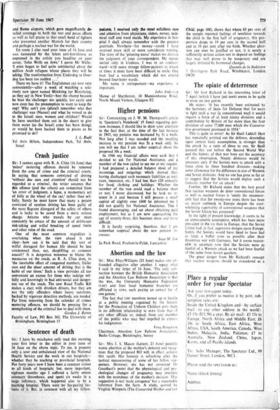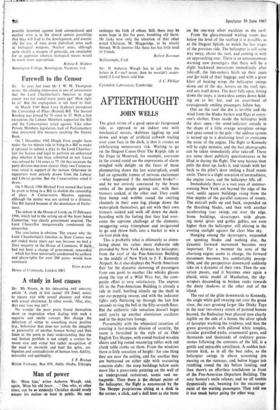The opiate of deterrence
Sir: Mr Ivor Richard in his interesting letter of 7 April (which I have just seen) seems to be quite in error on two points.
He states: 'It has recently been estimated by the Secretary of State for Defence that for NATO to fight such a war [a conventional war] it would require a force of at least ninety divisions and a contribution by Britain of far more than the four divisions of some 77,000 men which the Conserva- tive government promised in 1954.'
This is quite in error! As Sir Basil Liddell Hart has repeatedly pointed out the defence, depending upon certain basic assumptiOns, is stronger than
the attack by a ratio of three to one. Sir Basil pointed this out before the Second World War
and the history of that war bore out the accuracy
of this observation. Ninety divisions would be necessary only if the Soviets were to attack with a
force close to three hundred divisions— making some allowance for the difference in size of Western and Soviet divisions. And no one has gone as far as to suggest that the Soviets would deploy such a fantastic number for an attack!
Further, Mr Richard states that the best proof that nuclear weapons do deter conventional forces as well as nuclear forces is 'surely the unanswer- able fact that for twenty-one years there has been no major outbreak in Europe despite the over- whelming superiority of conventional weapons that the Soviet Union has possessed.'
In the light of present knowledge, it seems to be an unreasonable assumption, which has been more prevalent in the us than in Europe, that the Soviet Union had, in fact, aggressive designs upon Europe. Surely the Soviets would have liked to have had as large a buffer zone as possible after their disastrous war with Germany, but it seems reason- able to ascertain now that the Soviets were as fearful of a Western attack as we had been fearful of the same from Soviet quarters.
The great danger from Mr Richard's concept that nuclear weapons should be considered as a
possible deterrent against both conventional and nuclear arms is in the almost certain possibility that they will lead to the development, and eventu- ally the use, of even more diabolical arms such as biological weapons. Nuclear arms, although quite clearly a weapon of genocide. are unsuitable for an aggressor whereas biological means would be much more appropriate.
Robert E. Walters Bennington College, Bennington, Vermont, USA











































 Previous page
Previous page